Table of Contents
Table of Contents
- Introducing your landscaping business due diligence checklist template
- What is a landscaping business due diligence checklist template?
- Why do general due diligence checklist templates fall short?
- What are the key elements of a strong landscaping due diligence checklist?
- What are the most common landscaping due diligence mistakes to avoid?
Introducing your landscaping business due diligence checklist template
This template is designed to help landscaping professionals confidently evaluate potential acquisitions, partnerships, or internal improvements. It will cover areas such as financial records, tax compliance, operational processes, client contracts, and equipment health.
The template is structured as a checklist, enabling you to address important issues and ensure nothing slips through the cracks. You can customize it to suit your specific business needs, whether you’re evaluating a potential merger with another field service company or a large acquisition.
Use it to spot risks, discover opportunities, and make strategic decisions.
What is a landscaping business due diligence checklist template?
A landscaping business due diligence checklist template outlines key factors to assess when evaluating a potential purchase, partnership, or internal audit.
It helps identify legal, operational, financial, or client-related risks associated with the potential acquisition, ensuring no crucial detail is overlooked before a decision is made.
A due diligence checklist is typically used when:
Buying or selling a landscaping business. The buyer will need to review the state of the company they intend to purchase. The seller could use the checklist to prepare for the sale, addressing shortcomings.
Entering a strategic partnership or merger. Both parties need to evaluate their strengths, weaknesses, and compatibility.
Expanding or franchising. A checklist could help assess new markets and gauge potential profitability.
Seeking business financing. You can use the due diligence checklist to prepare documentation and strengthen the application.
Why do general due diligence checklist templates fall short?
Generic due diligence checklists fail to capture the unique operational and financial dynamics of landscaping companies.
While they typically include areas like:
Financials: Expenses, revenue, profitability, and tax compliance.
Legal: Contracts, litigation history, business structure, permits, and intellectual property.
General operations: Internal processes and IT infrastructure.
Human resources: Crew contracts, benefits, disputes, and compensation.
Market: Customer contracts, service area, and industry trends.
They overlook landscaping-specific considerations, such as:
Seasonal fluctuations in revenue and cash flow, since landscaping is a seasonal business with peak and low times.
Landscaping processes like crew routing, material procurement, or job site planning.
Detailed equipment storage and assessment.
Supplier agreement for bulk material purchases.
Long-term service contract agreement that drives recurring company revenue.
A custom landscaping due diligence template goes beyond the basics to address industry-specific opportunities and risks, providing a more accurate evaluation for decision-making.
What are the key elements of a strong landscaping due diligence checklist?
A strong due diligence checklist should cover financial, legal, contractual, operational, and seasonal realities associated with the landscaping industry.
Here’s an overview of what it should include:
Company overview and ownership: Brief information on the company, the current address, service area, ownership history, and business structure. Whether you’re purchasing a new business or seeking investors for your own, this detail helps you and the other party familiarize yourselves with the company.
Financial health: Every financial record, from profit margins to year-on-year trends, cash flow stability, seasonal fluctuations, and any debt obligations.
Customer base and contracts: Major service areas, renewal rates, ongoing warranty claims, disputes, and agreements.
Field operations and crew management: This is the company’s standard operating procedure. How do you procure landscaping materials? What’s the skill level and experience of field crews? Are there frequent training programs to equip the team? Focus on processes like scheduling, crew routing, job costing, issue resolution, incident reporting, and the use of a field service management tool.
Equipment and asset inventory: An inventory of the landscaping company's vehicles, equipment, and other assets, including their age and condition, maintenance records, and possible replacement needs.
Technology stack: A list of different digital tools used in managing operations, finance, customer relations, contracts, warranty, scheduling, and project tracking. Also, add their corresponding functions.
Legal, compliance, and licensing: Considering landscaping businesses typically operate under stringent regulations, licensing requirements, labor standards, and environmental laws, legal issues should be among the first things on the checklist. List available business licenses, current insurance coverage, zoning issues, and pending or resolved lawsuits.
Growth potential and market position: Brand reputation, geographic reach, and opportunities the field crew has to upsell services, expand into commercial accounts, or enter into new service areas.
Evaluating these factors can help you assess a landscaping business’s long-term viability and expansion opportunities—and uncover possible risks or strengths before making a decision.
What are the most common landscaping due diligence mistakes to avoid?
A major mistake when evaluating a new partnership or acquisition is overlooking the unique operational and seasonal aspects of landscaping businesses.
There can be a ripple effect of inaccurate assessments—making it harder to evaluate risks, spot opportunities, and make confident decisions. Below are other due diligence errors to avoid:
1. Overlooking maintenance contracts
Unlike other businesses with one-time sales and instantly trackable profits, landscaping companies often rely on maintenance contracts for sustainable, long-term revenue.
Failure to review these agreements, including their length, renewal terms, associated warranties, service histories, and scope of work, can undervalue or overvalue the business.
2. Ignoring equipment condition
Assets and equipment are the backbone of landscaping businesses. But listing them alone is insufficient when conducting due diligence.
To avoid expensive surprises post-evaluation, inspecting the equipment in detail is crucial. Examine usage data and maintenance history, including verifying the equipment or vehicle’s age.
3. Underestimating labor challenges
While field employee skills and experience are important metrics during due diligence, morale and workforce-related challenges are often overlooked.
Low crew morale, inefficient job scheduling, or an unbalanced wage structure can ultimately impact the landscaping business's service quality and profitability. Be sure to speak with the field crew to gauge their satisfaction and evaluate existing routing processes, compensation model, and scheduling system.
4. Skipping tech and systems review
A strong client base and online presence can give the impression that a landscaping business is digitally mature, but that’s not always the case. Popularity doesn’t guarantee optimized operations.
Failing to review the company’s tech stack, workflows, and data systems can leave you vulnerable to inefficiencies that hinder scalability and daily operations.
5. Disregarding compliance and licensing
Not thoroughly checking legal issues like local regulations, expired licenses, environmental regulations, and compliance with local laws can lead to serious setbacks for a potential acquisition or partnership.
Endeavor to review unresolved environmental violations and legal concerns.
6. Not asking for supporting documentation
Handshakes or verbal agreements aren’t sufficient during due diligence. Without proper documentation, terms can be forgotten or disputed.
Always request full records, from job records to resolved litigation, customer histories, financial records, tax filings, client contracts, warranty claims, and more, to validate claims and avoid post-acquisition surprises.
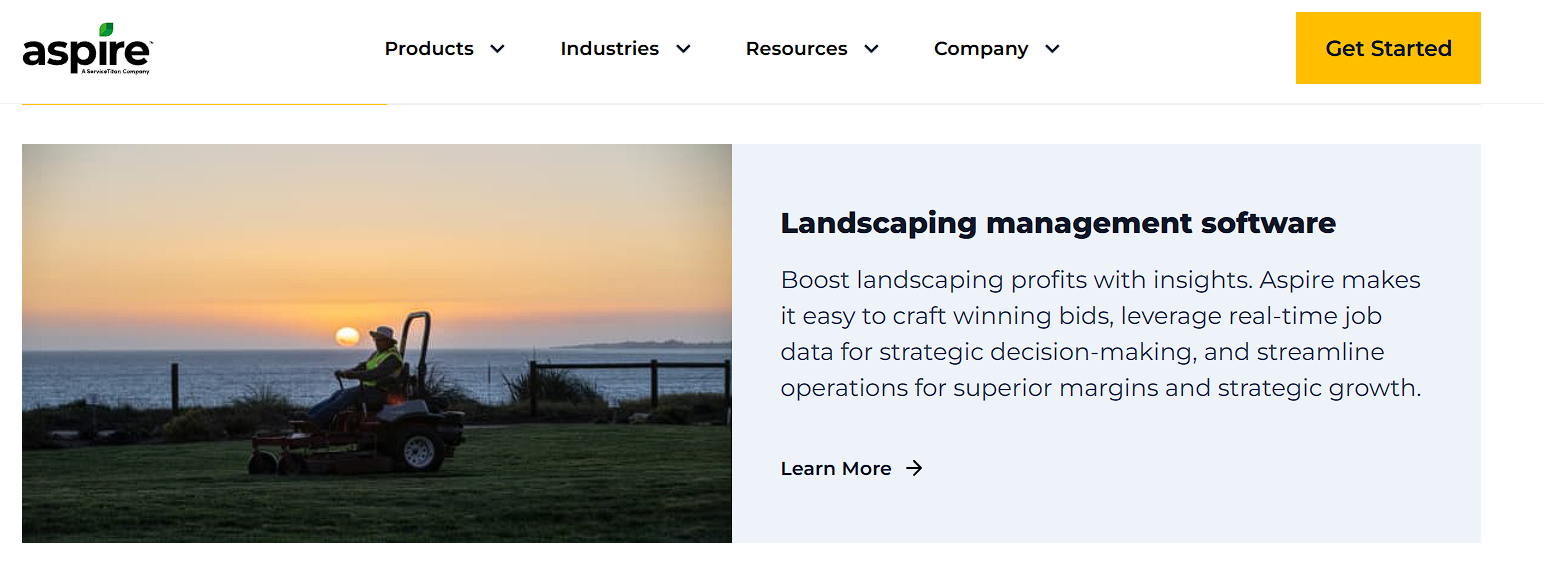
With clear insights into information such as operations, financials, and customer history, you’re better equipped to evaluate your landscaping business’s performance. This lets you identify growth opportunities and prepare for future acquisitions or mergers.
The platform enables this through features such as job costing, CRM, crew management, scheduling, and equipment inventory. Here’s how Aspire’s tools support due diligence and evaluation:
Real-time job costing: Aspire’s job costing feature shows you how estimated costs—labor, materials, and other expenses—compare to actual spend on a landscaping project. This helps you evaluate profitability in real time and identify where margins are gained or lost. It also makes it easier to assess the business’s financial performance during due diligence.
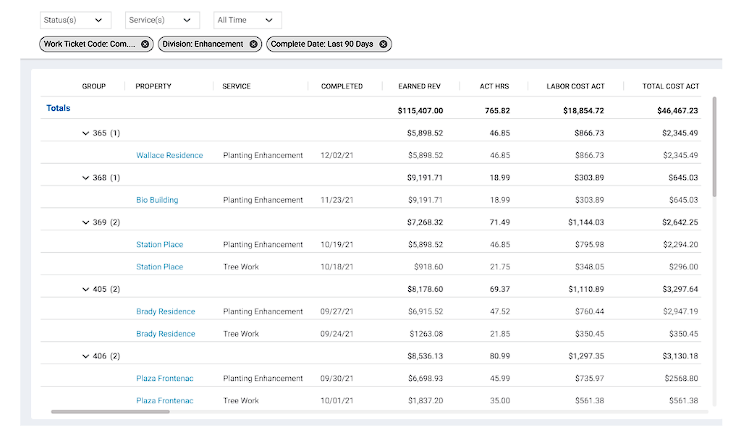
The feature automatically incorporates labor hours, material costs, and overhead allocation as they’re inputted, giving you an overview of any financial issues the business may have.
Visual crew scheduling: Seamlessly assign crews to projects as jobs are won. Aspire’s scheduling feature gives you a clear layout of ongoing projects, who’s assigned where, and for how long.
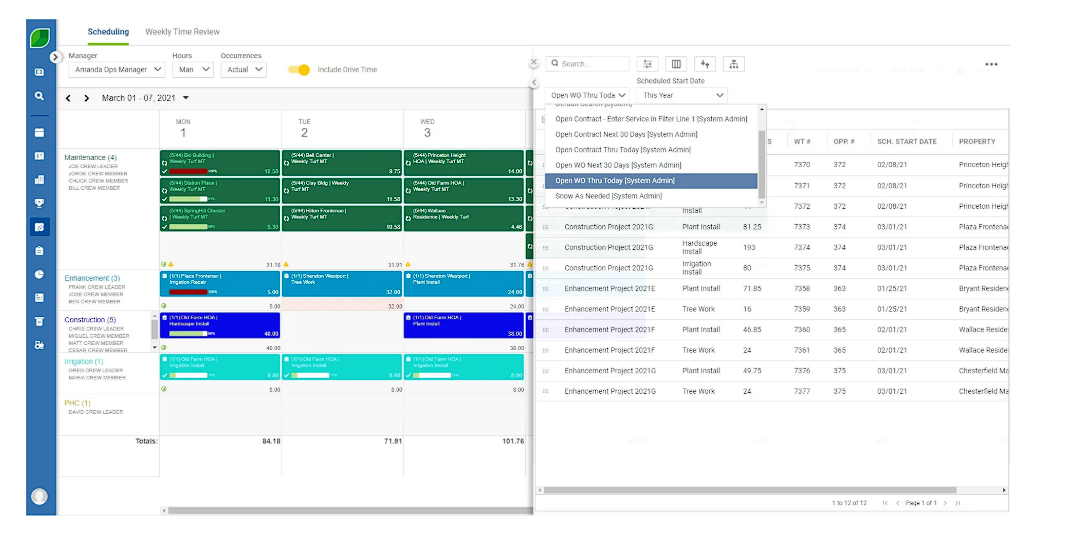
This helps you optimize routes effectively, balance workloads, and reduce workers’ downtime. It also gives insights into team strengths and skill gaps, which help evaluate operational efficiency during due diligence.
Centralized contract management: As an all-in-one business management platform, Aspire has a CRM tool that centralizes client contracts and communication, eliminating the need to toggle between apps or documents. You can easily view contract terms, renewal dates, warranty claims, and service histories.
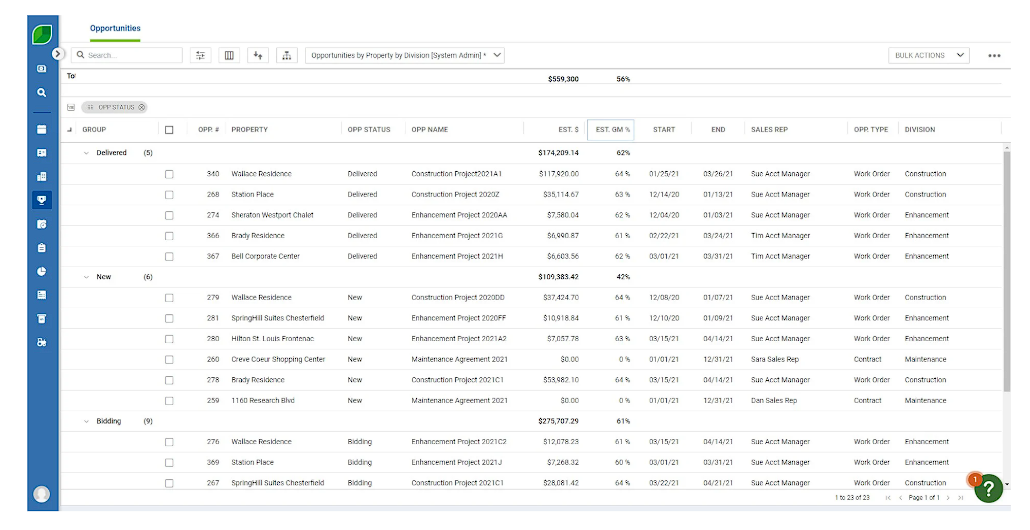
This level of visibility is helpful information when evaluating which client agreements generate the most revenue, have become liabilities, or can be quickly cancelled.
Equipment tracking and maintenance: During due diligence, don’t just list available assets and equipment; inspect their condition and long-term value. Aspire’s equipment management feature helps you understand what’s happening with your landscaping equipment.
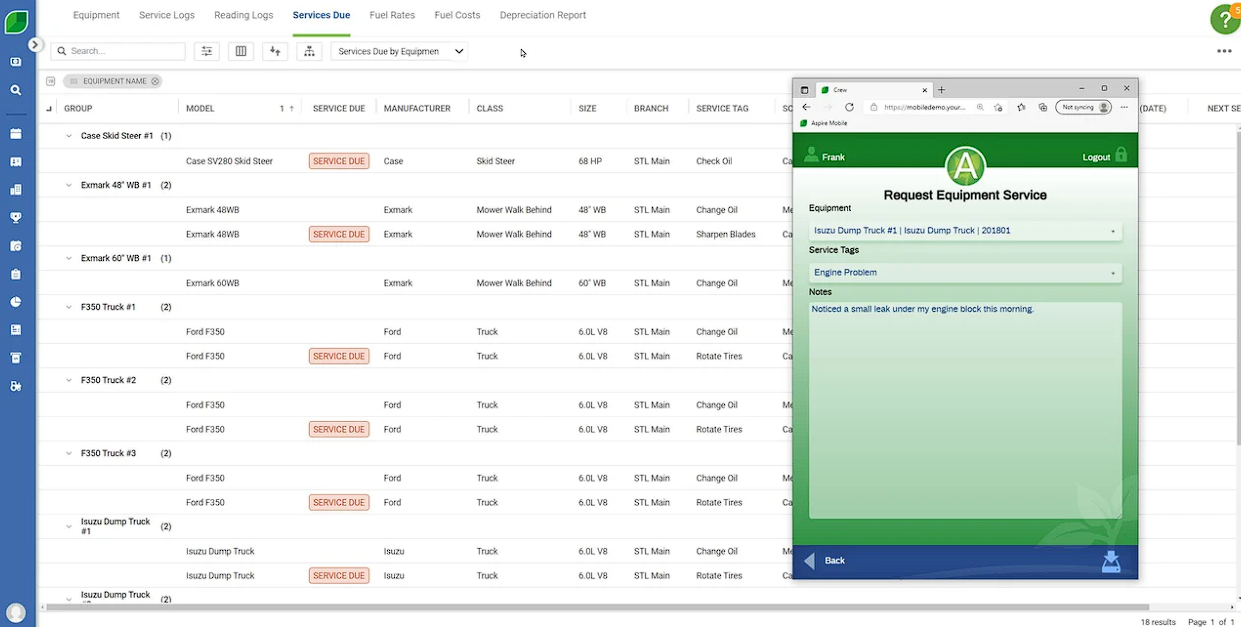
Once equipment is logged into the system, you can track usage, availability, maintenance schedule and history, equipment model, purchase date, and related costs.
It allows you to identify useful tools and those that should be replaced, helping you avoid incurring huge costs post-acquisition or partnership.
Business insights and reporting: Aspire provides real-time visibility into your landscaping business’s performance through robust reporting tools. It tracks data like job profitability, labor efficiency, revenue trends, cash flow, and project timelines—broken down by service type, property, or crew.
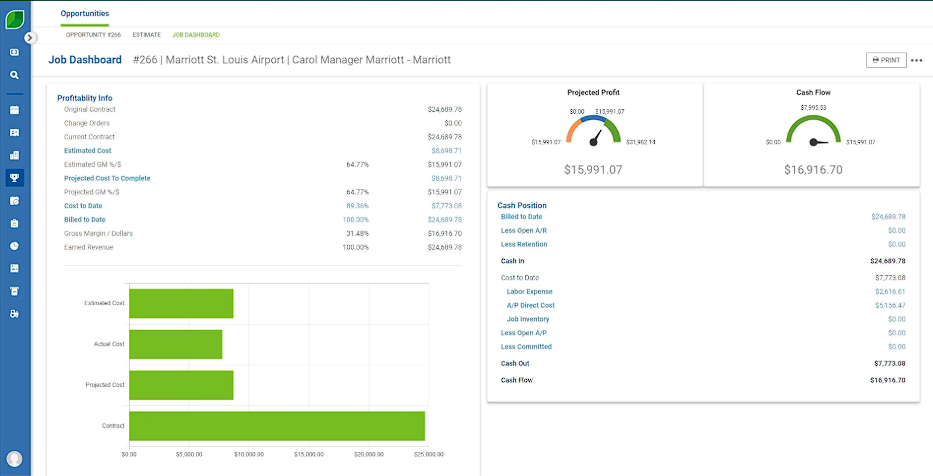
These insights help you spot risks, inefficiencies, and growth opportunities early. With this data readily available, you can make informed decisions that drive better outcomes and long-term success.
Cloud-based platform built for scale: Aspire is designed to grow with your landscaping business. As you expand across multiple projects, teams, service lines, and regions, it organizes and centralizes data in one platform. This gives you sufficient data on every aspect of your operations, whether it’s a simple or complex business, so that you can make data-backed decisions.
When you combine the due diligence checklist template provided above with Aspire’s powerful field service management feature, you go beyond the surface to truly understand the health of a landscaping business.
Aspire equips you with the real-time information needed to understand the business and make confident decisions.
See how it works; schedule a free demo with Aspire today.











